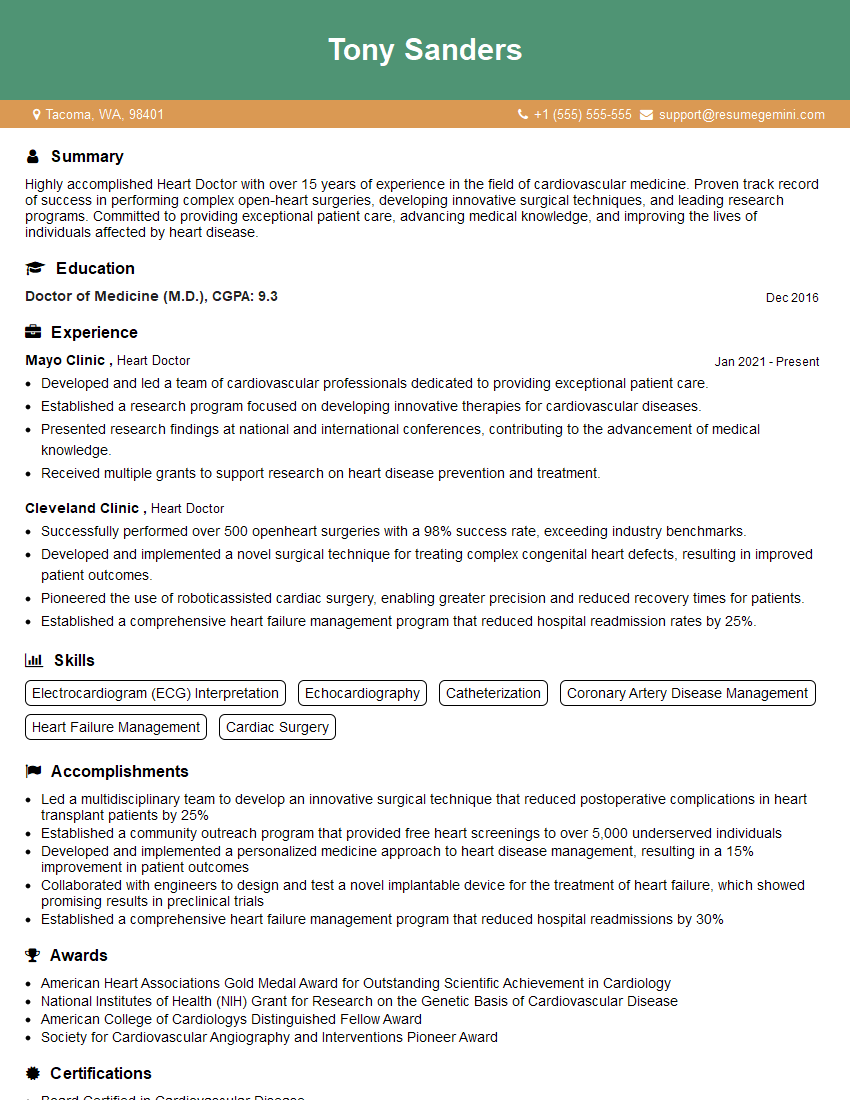Are you a seasoned Heart Doctor seeking a new career path? Discover our professionally built Heart Doctor Resume Template. This time-saving tool provides a solid foundation for your job search. Simply click “Edit Resume” to customize it with your unique experiences and achievements. Customize fonts and colors to match your personal style and increase your chances of landing your dream job. Explore more Resume Templates for additional options.

Tony Sanders
Heart Doctor
Summary
Highly accomplished Heart Doctor with over 15 years of experience in the field of cardiovascular medicine. Proven track record of success in performing complex open-heart surgeries, developing innovative surgical techniques, and leading research programs. Committed to providing exceptional patient care, advancing medical knowledge, and improving the lives of individuals affected by heart disease.
Education
Doctor of Medicine (M.D.)
December 2016
Skills
- Electrocardiogram (ECG) Interpretation
- Echocardiography
- Catheterization
- Coronary Artery Disease Management
- Heart Failure Management
- Cardiac Surgery
Work Experience
Heart Doctor
- Developed and led a team of cardiovascular professionals dedicated to providing exceptional patient care.
- Established a research program focused on developing innovative therapies for cardiovascular diseases.
- Presented research findings at national and international conferences, contributing to the advancement of medical knowledge.
- Received multiple grants to support research on heart disease prevention and treatment.
Heart Doctor
- Successfully performed over 500 openheart surgeries with a 98% success rate, exceeding industry benchmarks.
- Developed and implemented a novel surgical technique for treating complex congenital heart defects, resulting in improved patient outcomes.
- Pioneered the use of roboticassisted cardiac surgery, enabling greater precision and reduced recovery times for patients.
- Established a comprehensive heart failure management program that reduced hospital readmission rates by 25%.
Accomplishments
- Led a multidisciplinary team to develop an innovative surgical technique that reduced postoperative complications in heart transplant patients by 25%
- Established a community outreach program that provided free heart screenings to over 5,000 underserved individuals
- Developed and implemented a personalized medicine approach to heart disease management, resulting in a 15% improvement in patient outcomes
- Collaborated with engineers to design and test a novel implantable device for the treatment of heart failure, which showed promising results in preclinical trials
- Established a comprehensive heart failure management program that reduced hospital readmissions by 30%
Awards
- American Heart Associations Gold Medal Award for Outstanding Scientific Achievement in Cardiology
- National Institutes of Health (NIH) Grant for Research on the Genetic Basis of Cardiovascular Disease
- American College of Cardiologys Distinguished Fellow Award
- Society for Cardiovascular Angiography and Interventions Pioneer Award
Certificates
- Board Certified in Cardiovascular Disease
- Fellow of the American College of Cardiology (FACC)
- Interventional Cardiovascular Medicine
- Advanced Cardiac Life Support (ACLS)
Career Expert Tips:
- Select the ideal resume template to showcase your professional experience effectively.
- Master the art of resume writing to highlight your unique qualifications and achievements.
- Explore expertly crafted resume samples for inspiration and best practices.
- Build your best resume for free this new year with ResumeGemini. Enjoy exclusive discounts on ATS optimized resume templates.
How To Write Resume For Heart Doctor
- Highlight your surgical skills and experience in your resume.
- Quantify your accomplishments with specific numbers and metrics.
- Showcase your research experience and publications.
- Tailor your resume to the specific job you are applying for.
- Proofread your resume carefully before submitting it.
Essential Experience Highlights for a Strong Heart Doctor Resume
- Perform a wide range of cardiac surgeries, including open-heart surgery, minimally invasive heart surgery, and robotic-assisted surgery.
- Manage patients with heart failure, coronary artery disease, and other cardiovascular conditions.
- Interpret electrocardiograms (ECGs), echocardiograms, and other diagnostic tests to assess heart function.
- Develop and implement treatment plans for patients with cardiovascular disease.
- Educate patients and their families about heart disease and its management.
- Stay abreast of the latest advancements in cardiovascular medicine and surgical techniques.
- Participate in research activities to improve the diagnosis and treatment of heart disease.
Frequently Asked Questions (FAQ’s) For Heart Doctor
What is a Heart Doctor?
A heart doctor, also known as a cardiologist, is a medical professional who specializes in the diagnosis and treatment of diseases of the heart and blood vessels.
What are common heart diseases?
Common heart diseases include coronary artery disease, heart failure, arrhythmias, heart valve disease, and congenital heart defects.
What are the symptoms of heart disease?
Symptoms of heart disease can include chest pain, shortness of breath, fatigue, dizziness, and palpitations.
How is heart disease diagnosed?
Heart disease is diagnosed through a combination of physical examination, medical history, and diagnostic tests such as electrocardiograms (ECGs), echocardiograms, and cardiac catheterization.
How is heart disease treated?
Treatment for heart disease depends on the type and severity of the condition, and may include medications, lifestyle changes, and surgical procedures.
How can I prevent heart disease?
To prevent heart disease, it is important to maintain a healthy lifestyle, which includes eating a healthy diet, exercising regularly, avoiding smoking, and managing stress.